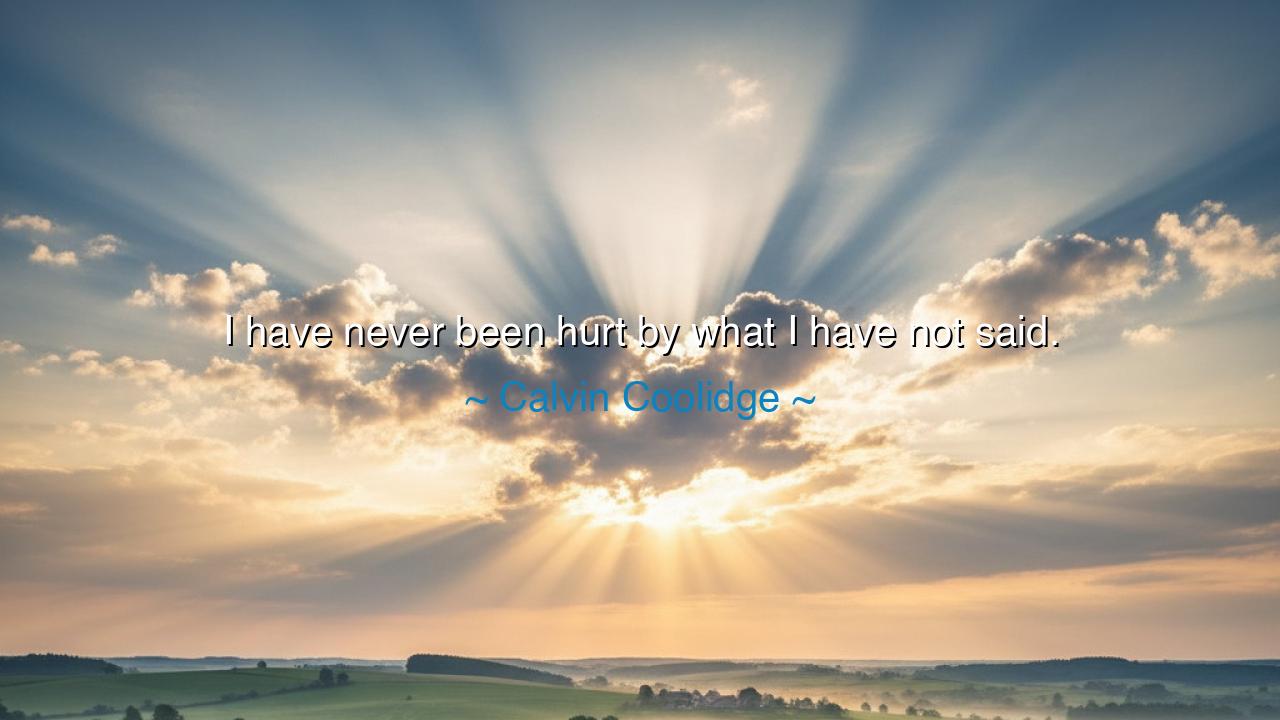
I have never been hurt by what I have not said.






"I have never been hurt by what I have not said." These words, spoken by Calvin Coolidge, resonate deeply as a reflection on the power of silence and the wisdom found in restraint. In a world where words are often spoken impulsively, in haste, or out of emotion, Coolidge’s statement reveals a truth that echoes throughout history—the greatest strength may lie not in what we say, but in what we choose not to say. In a sense, Coolidge’s words are a testament to the art of self-control and the virtue of thoughtful silence, both of which have been celebrated since the time of the ancients.
In the ancient world, the wisdom of restraint was not only appreciated but held in high esteem. Socrates, the father of Western philosophy, believed that the unexamined life was not worth living, and in his search for truth, he often said very little, choosing his words only after deep reflection. Plato, his student, echoed this in his dialogues, teaching that words should be measured, for once spoken, they cannot be taken back. Much like Coolidge, Socrates and Plato understood that silence has the potential to bring clarity, and that thoughtful speech, rather than hasty remarks, would carry more weight in the pursuit of truth and understanding.
Marcus Aurelius, the Stoic Roman emperor, also reflected on the value of restraint in speech. In his Meditations, he often emphasized that we should speak only when it contributes to the common good or helps others live virtuously. For Marcus, silence was a powerful tool for maintaining inner peace, especially in the face of anger or distraction. When we are quick to speak, he taught, we may invite chaos and misunderstanding; but when we hold our tongue, we allow time for reflection and can maintain composure in even the most volatile situations. Coolidge, in his concise manner, echoed this wisdom: the less we speak in moments of temptation or frustration, the less likely we are to harm ourselves or others.
Consider the example of Abraham Lincoln, whose greatest power often lay not in his words, but in his ability to remain silent at critical moments. During the Civil War, Lincoln was surrounded by advisors who urged him to take swift and decisive action, to speak out against his enemies, and to rally the nation in ways that might stir the crowd. Yet, Lincoln understood the danger of hasty decisions made in moments of passion. He listened carefully and only spoke when his words could heal, unite, or further a cause. Lincoln’s restraint allowed him to navigate the greatest crisis in American history with wisdom, a wisdom born not of excessive speech, but of careful consideration.
In more modern times, we see the wisdom of restraint echoed by figures such as Nelson Mandela, who spent 27 years imprisoned, often in silence, before emerging as the statesman who would help guide South Africa through the dismantling of apartheid. Throughout his life, Mandela demonstrated a remarkable ability to remain silent when provoked or in moments of deep emotional turmoil. His restraint was not born of fear, but of strength—the strength to wait, to listen, and to speak when the moment was right. In his silence, Mandela found the wisdom and composure to lead with a clear and focused mind, understanding that not every situation required a verbal response.
The lesson from Coolidge's words is not one of passive silence but of active restraint—choosing, in moments of stress, confusion, or anger, not to speak impulsively but to pause and reflect. In today’s world, where speech flows freely through the digital age, from social media to political debates, the act of holding back becomes increasingly difficult but also increasingly necessary. Coolidge’s lesson reminds us that we are not harmed by the words we withhold, but often hurt by the words we choose to release in haste. The ability to choose silence can give us the clarity to see our situation with fresh eyes, to evaluate our responses, and to ensure that when we do speak, it is with purpose and meaning.
In practical terms, we must learn to cultivate silence in our lives, especially in times of conflict or stress. When faced with situations that demand a quick reaction, we can choose to pause and reflect, allowing ourselves the time to think carefully before we speak. We should value our words as precious tools, not to be squandered on the heat of the moment, but used with intention. As Socrates and Marcus Aurelius advised, the art of silence can lead to greater wisdom, peace, and effectiveness in our actions. Let us, like Coolidge, hold our tongues when it serves us best, and allow our words to be few but filled with meaning and purpose.






AAdministratorAdministrator
Welcome, honored guests. Please leave a comment, we will respond soon